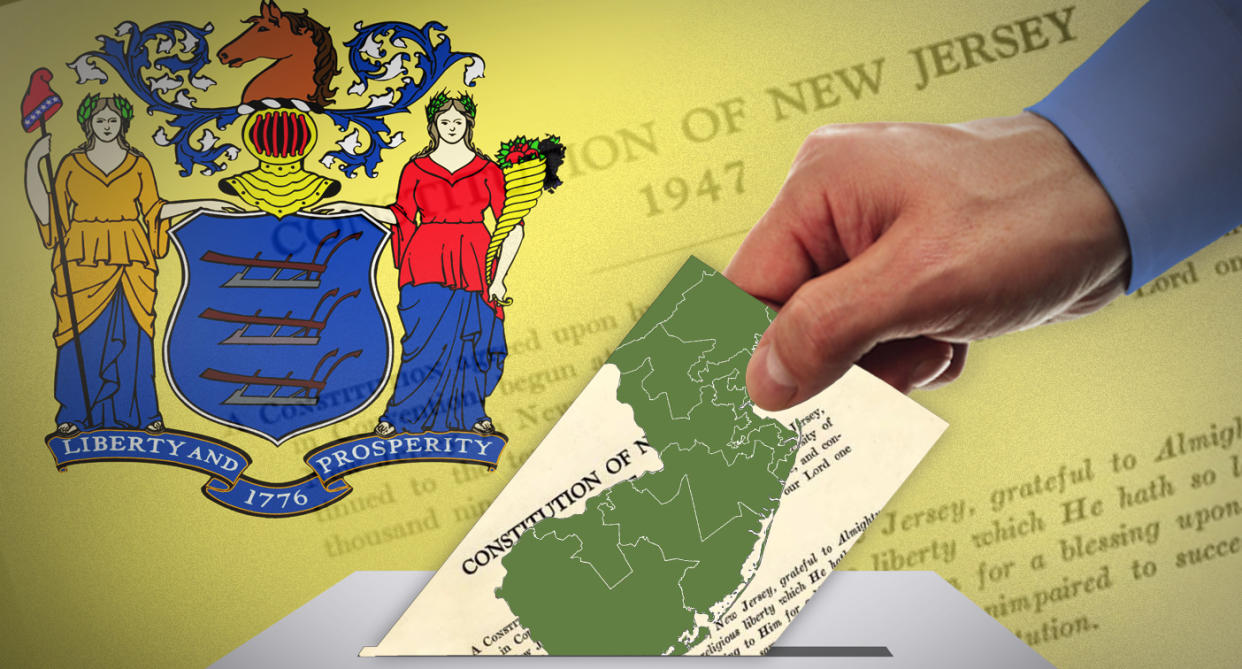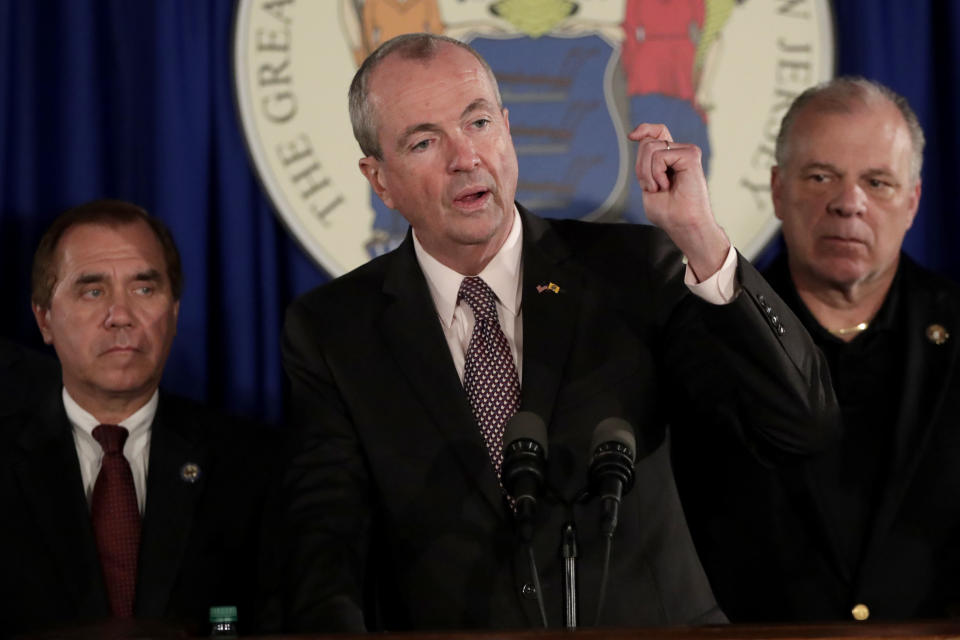New Jersey Democrats back down on alleged 'power grab'

In the face of opposition from Republicans, good-government groups and even their own party’s governor, Democrats in the New Jersey state Legislature have pulled a controversial referendum that critics said could have led to a permanent gerrymander in the state.
Democratic leaders in both houses of the Legislature pulled the plan that critics had likened to legislative power grabs by Republicans in Wisconsin and Michigan. One difference is that the criticism of the New Jersey plan came from prominent Democrats, including Gov. Phil Murphy. National Republicans have been mostly silent about the bills to restrict the power of incoming Democratic governors in the two midwestern states.
Another difference is that the New Jersey plan would go to the voters in the form of a ballot initiative. The Wisconsin bills were passed by the legislatures and signed by lame-duck Republican Gov. Scott Walker.
Opposition to the proposal came from “a very unusual alliance,” according to Helen Kioukis, program associate for the League of Women Voters New Jersey. It included New Jersey Republicans as well as Murphy, former attorney general Eric Holder, nonpartisan organizations like the League of Women Voters, and progressive activism groups.
“The uniqueness gave it its strength,” said Kioukis of the coalition, which had been monitoring the legislation since summer when it was posted on the Legislatures’ website. Alarm bells were raised around Thanksgiving and the pushback began, culminating in a pair of hearings on Thursday — held concurrently for the state Senate and Assembly versions of the bill, seemingly to make it more difficult for opponents to speak at both — where the only support for the legislation came from sponsors in the Legislature.
On Saturday evening, Democrats in the Legislature announced they were pulling the bill in advance of Monday’s scheduled vote, with questions over whether they had enough support for it to pass.
“This will give us the time and opportunity to review the input we have received from the public, our legislative colleagues and others to determine if any of these ideas would improve the proposal,” state Senate President Stephen Sweeney said in a statement.

The proposed amendment would restructure the committee that draws new districts every 10 years by giving the power to choose members to the Legislature, rather than state party leaders, and adding legislative leaders ex officio. It would mandate that at least 25 percent of districts be “competitive” based on election data, a formula that hasn’t been tested elsewhere in the country. In Kioukis’s view, it was a power grab away from voters that factored in the use of political data that her group would have opposed regardless of the party that was proposing it.
“Our coalition that came together within about a week shows that this is an issue that’s not partisan,” said Kioukis. “It’s about the voters, it’s about the people, it’s about protecting democracy, and we’re just happy that the leaders heard us.”
Louis D. Greenwald, the state Assembly’s majority leader, defended the amendment in an op-ed published last week amid the opposition.
“Despite dishonest rhetoric implying the new makeup of the commission is self-serving for legislators, nothing could be further from the truth,” wrote Greenwald. “This critical reform will remove the politics from the process by capping the number of legislators serving on the commission. The amendment institutes a first-time-ever ban on lobbyists on the commission.”
The way sponsors planned to get the measure on the ballot also raised eyebrows in the state. The usual procedure for putting a constitutional amendment on the ballot requires a three-fifths majority from both chambers of the Legislature, which would permit Republicans to block the measure. So Democratic leaders planned to invoke a provision that allows a proposal that passes the Legislature with a majority in consecutive calendar years to make the ballot. Thus Democrats could pass it before Dec. 31, pass it again in the new year and see it on the ballot.

That maneuver drew criticism from Murphy.
“I have as much a concern about the process as I do even about the substance,” Murphy said in an interview with the New York Times. “I don’t like the substance, but this is classic jam something through, and I got elected to stand up against that and I’m going to.”
Eric Holder, the attorney general under President Barack Obama and head of the anti-gerrymandering National Democratic Redistricting Committee, also spoke out against the plan.
“The American people want redistricting reforms that help level the playing field so that elections are decided on who has the best ideas, not which party was in charge of drawing the lines,” Mr. Holder said in a statement. “As currently constructed, the proposal in New Jersey fails to live up to those standards.”
Some analysts, however, questioned whether the Democrats’ plan would have been effective even if it had been passed into law. An analysis of the legislation by the Princeton Gerrymandering Project found that the Democrats could potentially end up locking themselves out of a gerrymander if there is a Republican bump following the 2020 election. The group recommended amendments that would prevent the party in power from locking in gerrymanders “under the radar.”
Will Adler, a Princeton research specialist who works on the Gerrymandering Project, told Yahoo News that the proposed amendment would allow both parties to deny that they were engaging in gerrymandering, while not necessarily locking in a Democratic advantage. Sam Wang, a Princeton professor who co-authored the report, said he thought the coverage had been overblown because it wouldn’t be an effective gerrymander for the Democrats.
“I would say that it mainly accomplishes nothing because it is poorly crafted,” Wang told Yahoo News in an email. “Since there’s little payoff, it doesn’t seem to be worth the amount of criticism that New Jersey Democrats are getting. It also gives a meaningless rubber stamp to a wide range of bad acts by both parties.”
Still, Adler understands some of the blowback to what he considers flawed legislation.
“I think the public is now much more aware of gerrymandering and redistricting as being an important issue,” said Adler. “I think people more and more believe voters should choose their politicians instead of the other way around, and this bill goes in the opposite direction of that. It requires legislators to serve on this committee. That’s not the direction the rest of the country’s moving in.”
“The reform community is not pushing for these sorts of changes,” added Adler.
______
Read more from Yahoo News:
Blackwater Beef anyone? Private security company’s founder now sells a different kind of muscle
Plea deal by Russian agent Maria Butina describes 2016 influence campaign
U.S. intelligence sounds the alarm on the quantum gap with China
Trump first wanted his attorney general pick William Barr for another job: Defense lawyer
Photos: Explosion injures dozens in Sapporo, Japan restaurant



